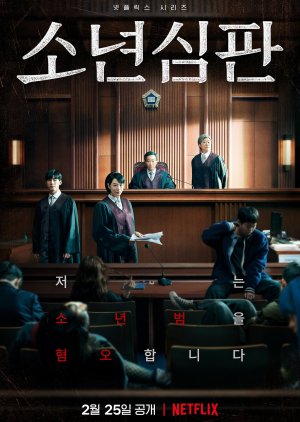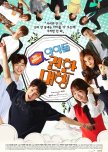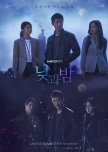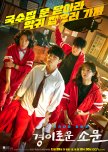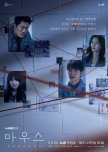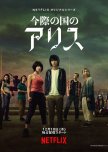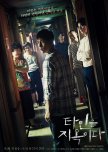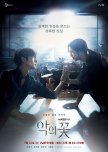
The Effects of Juvenile Delinquency And the Role Society Plays
From its opener, this drama came out swinging, and it didn't stop to the end. I had high expectations, and I am glad it didn't disappoint. I thoroughly enjoyed this drama, everything from the overwhelming storytelling and cases to the cinematography, directing, and especially the acting of the leads and the supporting cast. Both Kim Hye Soo and Kim Mu Yeol were outstanding, and complimentary of each other. Her strong stance on punishment and his clear belief in nurturing and reform completed each other in many ways. It was almost like when she ran cold, he warmed her up, and when he threatened to go cold, she found a way to warm him up. Their personal traumas helped me understand their stance and shaped the story.What I like most about this drama is how daringly it tackled the complex and staggering psychological and social circumstances surrounding juvenile delinquency, the juvenile court system, and the effects it has on the victims, the juvenile delinquents themselves, their families, and even society as a whole. The thought that the stories it tells maybe someone's real life reality is heartbreakingly crushing. Right after I watching Juvenile Justice I read a review that described the script as "having a tendency to devolve into preachy monologues, which did a disservice to the drama". I was utterly surprised, because I thought those preachy parts were precisely what made the drama so impactful, given the heavy subject matter.
As much as I enjoyed the drama, some episodes were hard to watch, almost cruelly so, especially how desensitized society has become to the pain and injustice of others. The drama was thought provoking. It made me question myself and how I would react to the many uncomfortable situations. I have a newfound respect and admiration for juvenile delinquent judges, counselors, social workers, and everybody who works with and around children. I don't think I could do it. The whole time I watched the drama, I kept thinking that when parents cover up for their children's wrongdoings, are they doing it for their children or for their own sake? I also couldn't stop thinking how children as young as nine could be so disconnected from their community and society that they could commit such atrocities; where and how does it go wrong, be it with the children, the parents or society. A lot to ponder.
I am not a parent, but I know it isn't easy. As an aunt actively involved in raising my nieces and nephews, I know how important it is for children to know that they are loved unconditionally, particularly when they make mistakes because everybody make mistakes. But they also need to those mistakes have consequences, especially when they cause harm to others. Parents sternly disciplining their children is the tough love they need. It's far more helpful in the long run than covering up those mistakes, no matter how bad. And this is especially important in a country like South Korea, where society plays a big role in shaping its citizens, that it becomes part of the solution, not a contributing factor. I wonder if I sound preachy, hmmmm!
Juvenile delinquency isn't just a legal issue that can be taken care of by law, but a major social problem that requires urgent attention. I pray this drama in its ten episodes succeeds in casting the needed attention, and more importantly, to relay the message that punishment shouldn't only be about imprisonment, but also development and reform. As Shim Eun Seok says in the drama, it takes a village to raise a child. It's why we still need the "village" strengthening support mentality for our children today. Is Juvenile Justice a perfect drama; perhaps not, but it does a darn good job expressing how the inadequacy of the criminal and judicial justice system, the breakdown of the family unit, particularly parental guidance, and resulting trauma as well as societal neglect exacerbate serious youth crimes. Yes, reforming juveniles is paramount, but their victims matter too and shouldn't be marginalized in the process.
Was this review helpful to you?

This review may contain spoilers
The Bad Kids
Juvenile Justice is a character-driven legal thriller revolving around Shim Eun Seok and her appointment as a judge of the Juvenile Criminal Settlement Division of the Yeonhwa District Court. Her profound hatred of juvenile delinquents provides the backdrop of her approach to dispensing justice upon the minors charged in the court of law as she presides over a variety of deeply complicated and convoluted cases.The drama is rated R-18 in South Korea due to references to drugs, suicide, physical and sexual violence. Elements of social commentary are present that explore the judiciary statutes, investigative authority, politics and education system. The complexities of the human drama is provided by the respective backstories of the juvenile offenders in terms of their difficult family backgrounds and dynamics, as well as the suffering endured by the victims and their own families.
The screenplay is written by Kim Min Seok for what is his first drama project. Although credited as an original screenplay, it purportedly draws parallels to several high profile cases that have occurred recently in South Korea; the 2017 kidnapping-murder case of an elementary school student in Incheon, the 2018 Sookmyung Girls' High School test paper leak in Gangnam, the 2020 Daejeon middle school student rental car theft accident, and the 2018-2019 Incheon Metropolitan City sexual assaults.
Directed by Hong Jong Chan with Kim Tae Sung (Happiness, Snowdrop, Inspector Koo) serving as composer. Principal photography took place in May 2021 primarily at Jeonju District Court located in Jeollabuk-do, which serves as the Yeonhwa District Court. Other filming locations include Dongseong-ro Spark in Daegu, Dongseong-ro Spark and Misa High School in Gyeonggi-do, and Seoul Women’s University.
What I Liked
There are three main aspects that have impressed me immensely.
Firstly, high praise goes to the overall production values, specifically the mood-inducing cinematography that establishes the noir vibe to the entire visual tone of the production. This fits perfectly to a narrative that delves extensively into the dark subject matter of violent crimes, together with the slow burn and gritty storytelling approach. In fact, a huge portion of the drama takes place at night where one of the more memorable moments included snowfall in its scenes. I’ve also enjoyed the framing of Shim Eun Seok’s contemplative moments in her office through low-key lighting that accentuates the evocative atmospherics throughout the story. There’s no question that a lot of money went into this production and it is apparent for all to see.
Secondly, the exceptional acting in this drama. Particularly Kim Hye Soo’s portrayal of the lead character, Shim Eun Seok. This is quite possibly her strongest performance in recent memory which I believe surpasses her role of Jung Geum Ja in Hyena and perhaps aided tremendously by the characterization that feels very much designed with her in mind. This is the epitome of intensely hard-boiled and ultra bad-assery without so much as breaking a sweat. The emotive expressiveness of her unflinching piercing gaze that punches right through any suit of armour is as intimidating as it is effective.
Other members of the cast that impressed me would include Lee Sung Min as Kang Won Joong, the Chief Judge of the Juvenile Criminal Settlement Division of the Yeonhwa District Court. Initially giving the appearance of the typical annoyingly loud and abrasive boss, he gradually settles into this extremely layered and grey character who is torn between his personal ambitions and protecting his family.
I also have to mention Lee Yeon. My first time seeing this 27-year old lady in what is truly an incredibly remarkable yet unsettling depiction of an extremely unhinged teenage boy! It’s the kind of performance that leaves an indelible imprint in your psyche for years to come. The drama also features a number of familiar faces in the supporting roles including Lee Jung Eun as Chief Judge Na Geun Hee, and Kim Mu Yeol (currently in Grid) as Division Judge Cha Tae Joo. Yeom Hye Ran (The Uncanny Counter), Yoo Jae Myung (Hometown) and Kim Joo Heon provide noteworthy guest appearances.
Thirdly, I was captivated by the intrigue of certain cases. Going into this drama I was anticipating a more “common” or “garden-variety” type of crime committed. After all, how much trouble could kids really get into, I thought to myself. Well, I was proven very wrong because some of the crimes manifested belong to the psychologically disturbing and immensely macabre category. The one that caught my attention from the get-go has to be the first case while the second case provided a fascinating insight into juvenile rehabilitation facilities.
What I Didn’t Like
My biggest issue is with the screenplay. I think Kim Min Seok was trying to weave too many themes and sub-plots into a 10-episode production, most of which finally play out in the final 2 episodes. I can’t say for sure if this drama is merely providing social commentary or perhaps the screenwriter is attempting to convey a statement or message that raises public awareness. Or it could simply be heavily dramatized fiction that’s intended to wow (or shock) viewers.
Whatever the case may be, the end product becomes something of a contradiction for me. It’s not ok for other people to abuse their authority but when it comes to the protagonist, it’s perfectly fine. It’s not a big deal for other cases to reach a dissatisfying conclusion but when it involves the lead’s tragic backstory, then justice must be fully administered at all costs. Judiciary bosses with years of experience are a bunch of noobs in comparison with the junior judge for they do not comprehend the spirit of justice, which justifies acts of insubordination. Finally, that sense of self-righteousness and moral high horse that comes complete with the speech gets repeated several times, only to be refuted by hypocrisy when convenient.
My interest in the second half kind of waned because the focus was lost amidst the tonal shift of the narrative, firstly to the politics of education and by-election campaigning, then finally to Shim Eun Seok’s complex backstory. This aspect wasn’t properly fleshed out but instead given the brief flashback sequence, alongside elements that eventually become inconsequential in the form of the ex-husband and mother-in-law who contributed nothing of significance apart from melodramatic angst.
Final Thoughts
The biggest positive for me is Kim Hye Soo’s performance which I hope would garner her at least a nomination for this year’s Baeksang. Juvenile Justice ended up being a mixed bag for me but all things considered, I would recommend this drama predominantly for the well executed technical aspects rather than the plot trajectory and didactic social critique.
Was this review helpful to you?

"I detest young offenders"
"Offender, Criminal, Killer" what comes to your mind when you hear these words?Maybe, a maniac, a psycho or a monster and disgusting adult human being? But what about a child? In most of the drama/movies we see adults committing crimes, but young offenders exist too.
And this is what "Juvenile Justice" wants to remind us, that criminals can be anyone, even a little child. "Juvenile Justice" deals with a very interesting, yet very difficult and provoking theme. Fortunately, though, the drama succeeded in managing its heavy theme and ended up a very eye-opening drama for me.
As "Juvenile Justice" it's a law drama which deals with many inhuman crimes (and it's also a Netflix original drama), it's an R-rated drama, which contains a lot of violence, gore scenes but mainly, it contains a lot of scenes that may upset psychologically some viewers. In addition, the drama doesn't contain any funny moments, or comic reliefs and its pace it's slow too. Thus, the drama is indeed a heavy and difficult watch, it will punch you in the stomach without any pity for 10 hours straight. Therefore, be very careful when you make your decision to watch it.
The story
The story revolves around the Juvenile Judge Shim Eun Seok. Through her eyes we are able to see how Juvenile Justice works on many different cases and affects the involved ones and that's the biggest advantage of the drama.It approaches its topic from many different aspects and shows the two sides of the coin of crime but also the law system.
It has to be mentioned though, that the number of different cases may have a negative effect on some viewers because they won't like all the cases the same as the cases aren't on the same level and some are more interesting than others. Despite this fact, I believed that all the cases offer something valuable to the story and also, that the story's coherence is great as every event of the story is very well connected with the other so the overall story is very balanced.
The story starts with a shocking abominable and macabre case which gives a strong and promising start. The middle cases are milder but the story doesn't lose its interest neither becomes tedious and repetitive. The story throughout its whole run, asks moral questions and tries to make the viewers think of various different situations and dilemmas. The final case, the story’s finale, gives a decent and powerful closure. The story indeed leaves the best for the end as from all the cases, the last one is the most suitable for closure . Thus, the story manages to end without the feeling of being rushed or unfinished. To my surprise, Netflix made a (maybe) one season kdrama that is complete and I'm very glad and relieved about this.
There's a high possibility that the first case and some others are inspired and lightly based on real cases which have happened in Korea and I personally really appreciate it. It's very interesting to see how writers use real events to deliver their messages and basically, to see the impact these events had on them. In addition, the story feels more down to earth and more realistic. Korean dramas and movies have their way of making excellent and entertaining stories based on real events. Fortunately, "Juvenile Justice" is one of these stories. More details about the cases in the spoiler comment on this review (because they are, of course, spoilers).
The characters & acting
Almost all the characters of the drama have depth and their personalities are very well built. Their actions are always composed of their life experiences, scars, insecurities and the drama explored with success the reasons behind their behavior. None of the characters is perfect, everyone made mistakes and some learnt through them, some not. It’s pretty amazing how the drama made so many well written characters and developed their personalities through the story, this is very rare to see.
And of course, the actors did an amazing job portraying these complex characters. I couldn't be more satisfied with their performances. Their feelings were on point and the characters really came to life and took shape. There was also great chemistry between the actors that made the characters more bound and the drama complete and more impactful.
The production
Production is the last ingredient of a drama. It's the finishing touch that will make the drama more appealing. The "Juvenile Justice" 's production, as far as the directing is concerned, isn't one of Netflix's top-notch and artistic ones, but still, it's great and gives the drama the right tone and atmosphere, making the drama very decent and beautiful. The music is wonderful, full of emotions. It gives the right tone in every scene and it never feels off. The music is the cherry on top of the drama, giving you the last push to fall in love with it.
Overall
"Juvenile Justice" is a very tough watch and not an easy ride. Still, the things this drama will make you feel and think are countless. If you believe you can bear its cruelty, then "Juvenile Justice" really deserves a try because from the story, to acting, to production, this drama has the whole package. For me, "Juvenile Justice" is the first Netflix original kdrama I loved after "D.P. " and I'm glad I watched it.
~~~Epilogue~~~
"I detest young offenders". Young people are the future of humanity, humanity’s hope. When they behave like adults and commit crimes, the world loses its hope and everything becomes darker. Why do young people commit crimes? How can someone so young do such a macabre thing? Can we teach them what is good and what is wrong? Can we set them back to the right path? In the end, is it their fault or ours?
"I detest young offenders" because they are showing me how cruel the world is and how we fail to protect them.
Was this review helpful to you?

Kim Hye-soo really never disappoints
Kim Hye-soo really never disappoints. Outstanding performance from Lee Jung Eun and Kim Hye Soo. All the ten episodes of Juvenile Justice will leave a strong impression, there is so much more to the justice that is being served. There is one thing that literally amazes me, that is Shim Eun Seok (Kim Hye Soo) character, her hatred and despise to the young kids who commit a crime, her anger, and her facial expressions every time a kid stands in the trial, felt so real.The ending was so beautiful. I hope there is a season 2.
Was this review helpful to you?

Hate to say this but Netflix doesn't disappoint
"I detest young offenders" - I somehow agree with it LOL. Although everyone deserves second chances but sometimes it just shows that you shouldn't be lenient with all minors just because they are minors, they will not learn their lessons and their mistakes and grow up to be monsters if you continue to let them go and let them think that "oh, so I can commit this crime and I won't get caught at all" and they will commit more and more crimes and each time it gets worse. Honestly got quite pissed when I saw the kids laughing away after killing people. Coming again with another well written series by Netflix. What I'm seeing now is that the show is criminally underrated for now, not many viewers are watching this, not sure whether more people will start watching this after a few days as this was just released few hours ago. But this show was really nice, it shows and depicts the many different social issues surrounding young offenders. Though it's not the first time a drama has done this but this one was quite well written. It was really entertaining and engaging so I binged it in one whole sitting. :) Kim Hye Soo done a great job as a Judge, likewise in Hyena as a lawyer. She really suits playing characters relating to law haha. GOOD SERIES OK TRUST ME!! Very good law drama and unique theme of young offenders, give it a try.Edit: It is now sitting at #1 spot for many countries on Netflix.
Was this review helpful to you?

This review may contain spoilers
Everyone deserve a second chance?
This drama came from my same list that had Amanza, melancholia, move to heaven and Doctor John, all of them set in dramas that I am not used to seeing and all of them were my favorites.It is very slow, I even watched it at 1.5x speed because if I don't I would never end, but that was not a problem for me.
It has graphic scenes of violence and they are always talking about the heavier cases like prostitution and rape, which I found very interesting, since Korea itself has a lot of these cases but they are usually very "covered up".
Does everyone deserve a second chance? I think this is the main point of the dorama, here, we see two sides, the FM even mentions that they could minor offenders and gives maximum penalty whenever possible, after all, they committed a crime, being a minor or not. On the other side, we see ML who understands that they are young offenders but that some need to have the chance to possess a second chance. I thought it was very well written that in some moments, which one of the two is right weighed heavily on the episode, but in the end we came to the same conclusion:
It is not up to us who saw it to judge who deserves a second chance or not and yes, to the judges based on evidence.
Overall, it was a very different drama from what I watch and always in the second episode of all the stories I was extremely heartbroken because I realized that the story doesn't end after the trial, after all, the victims and the families will always suffer about what the minor offender did.
Was this review helpful to you?
This review may contain spoilers
A show where judges masquerade as police officers
I am not exactly sure what genre this drama is supposed to be. Legal? Police procedural? Thriller? And in all honesty, I don't think the showrunners know either. This drama tries to be all of the above yet succeeds at none. The "police procedural" parts of the show are horribly unrealistic and do nothing but to detract from the main theme of the drama. "Judges are not supposed to get involved in prosecution or investigation!!!!" are words that have been yelled by 2 senior presiding judges yet main character (Sim Eun Seok) still throws caution to the wind and go on with her own investigations. Despite this, the evidence she obtained through her illicit investigations are still admissible in court! Like what??? I'm not a lawyer, but I sure as hell don't think JUDGES would get their hands dirty or even have the TIME to conduct investigations themselves. And I mean if the judges are gonna do the investigations, why do we even need the damn police? This is too ridiculous. But wait, the icing on the cake is in the last episode. In the last episode, she waltzes right into a baddie's hideout which for some reason, isn't locked and doesn't even have a DOOR to prevent entry. Surprisingly (or not) she gets ambushed and only escapes by the skin of her teeth. Injured and seriously bleeding, she gets into a taxi and makes her way speedily to guess where? HER FKIN OFFICE. I literally laughed out loud. Like ok, the show has consistently portrayed her as an obsessive workaholic (more on her character later) but this is just too far beyond the realm of realism. Not to mention all the evidence in the baddie's hideout was also nicely displayed for the authorities to collect. Just absurd. Parts of the dialogue also sounded like they were right out of a PSA on the social system of Korea, with characters literally rambling on the differences between a social care home and a facility. I get that viewers need some context on Korea's social welfare system but what?! NOBODY speaks like that in real life, unless they are narrating for a documentary. "Show, not tell" is a really apt saying that this show should have heeded.Unrealistic parts aside, I also felt that this show had a lot of unrealized potential. There was commentary on social issues like income inequality, nepotism, lack of funding/resources for social welfare programmes etc but they were all skin deep and didn't do much to explore the issues further. For example, many cases centered on kids from disadvantaged backgrounds committing crimes. Judge Sim comes into court, makes a few holier than thou comments like how circumstances push the kids to commit crimes but at the end of the day, the kids make the decision to commit crimes themselves. The end. Next case. They could have done more with the material by portraying kids from bad backgrounds committing crimes VS kids from good backgrounds committing crimes (nature vs nurture) OR even gone deeper into Judge Cha's story of being a reformed teenaged delinquent but oh well.
This brings me to the next point of the characters. Judge Sim is extremely unlikeable to begin with, and even when her tragic backstory is revealed (they always have tragic backstories don't they?) she is still unsympathetic. She is extremely self-righteous, curt, cold and seemingly devoid of empathy whatsoever except towards the victims. Her stunning lack of empathy was on full display when she confronted her boss about his alleged corruption in the freaking HOSPITAL where his son was warded after an attempted suicide. Yes, as judges, one has to be upright and honest but dude?? Time and place man. Her self-righteousness also spills over to how she treats the defendants and even her colleague Judge Cha who is forced to capitulate to her every demand. Judge Cha is the typical "nice guy" who believes in treating kids with respect and believing in them, but Judge Sim constantly steamrolls his every opinion. In their conversations, Judge Sim goes on long tirades about how she detests juvenile delinquents and do not believe they would be rehabilitated, that they need to feel the full force of the law... leaving poor Judge Cha quaking and unable to resist as she is his senior. The show validates this strangely, going out of their way to portray the juvenile delinquents as unrepentant, lying scums of the earth who should be locked up for good since they'll just end up as adult criminals anyway. Makes me wonder if the writer had a grudge against juvenile delinquents or something.
Overall, this show is fairly entertaining but don't go in expecting to be educated on Korea's juvenile court system. The acting is decent, with the teenaged actors stealing the spotlight. Kim Hye Soo was decent as Judge Sim, though she wasn't able to show off her range as her character was mostly cold and reserved. Watch only if you can ignore the unrealistic parts and if you do not mind a show with an unlikeable main character.
Was this review helpful to you?

This review may contain spoilers
In the world of repetitive korean law dramas, this was unique, heartbreaking, devastating and sickening The villains were kids and the victims were kids, how more heartbreaking can it get?
The cases tbh I couldn't look at them and if I did I had to keep repeating "it's just acting" cuz my heart can't take that much evilness
The fl was a queen. Eventhough I didn't like her roboticness or the need to add a traumatic past to explain why she's so reserved and cold was unnecessary
But I did love her soft side
The ml was a nice cutie and the silver lining to this bleak world
The 2ml was also a mix of ambition, greed and yet hope
They tried to make 2fl judge the villain just to show she like any other human makes non perfect decisions
And that the point. Not all verdicts were justified. Not all victims were saved. Not all villains were captured. Law is "in the eye of the beholder" cuz there's no real justice
No one knows the whole truth. No one can ever find justice. They can only do their bests. Find evidence. Listen to the hidden stories. And that's a devastating job tbh
Especially with kids. Cuz the real justice would be to reform them. Not all criminals are "born that way" but you can't put an end to it even when you know the problem..
I didn't like the cheating crime.. it's literally just a test, people cheat, people steal answers, people buy grades.
I personally preferred my own results, once upon a time a I actually went to an exam not knowing there was one so I hadn't even studied that subject in weeks and someone offered to help but I shrugged it off and got 7/10 on my own xD
Another time the exam supervisor saw me finish while another kid was suffering and she came to my paper and helped the other kid. Once I tried to help a friend but it was a lost cause so afterwards I'd pretend I didn't study and sit away from people I knew..
This got out of hand but basically cheating is not the end of life. Stealing, murders, rape, kidnapping, even bribery are worse than school cheating...
In the last ep tho I didn't like how they had to make everything extremely connected and I wished for the verdict of that crime cuz it either needs life sentence or execution.... TT_TT
I loved the ost but I'll never rewatch this
Was this review helpful to you?

It takes a village to raise a child…
A tale of a broken system and juvenile crime.Who is at fault when a child commits a crime? Juvenile Justice tries to present the complexity of the issue, and for the most part, it succeeds (as much as a fictional drama can). It presents kids as both the victims and perpetrators, rightfully pointing out the roles are not mutually exclusive. It shows the effects of neglect, bad or lack of role models, abuse.
A small group of people trying to do their best in the system that does not support their efforts and does not protect the people it was created to protect. While showing the gruesome reality, it sticks to a more positive, but still realistic approach. Often justice is served, but only in the frame of the current juvenile court system, that for many is not harsh enough.
From the first, till the last episode the drama does not fail to keep the tension high, keeping me on the edge of my seat. The cases are not one dimensional, showing different sides and perspectives, at times, leaving me with only one conclusion: everyone failed - the parents, the teachers, the judges, the kids themselves.
The plot and presentation wise, the only thing that it lacks in my eyes is the context some of the kids were in. What pushed them to become what they are? What could be the possible motives for their actions? What behavior was a norm in their house? These are the questions I hoped to get a more elaborated answer for than a short note “abused by step-father” in the case file.
Moving back to the positive aspects: I appreciate how we do not get an outstanding character development from any of the main cast. They all made mistakes, they all got carried away by their emotions and fears. That said, how they handled Na Geun Hee’s character by the end of the show left me with a few things to desire. Did not buy that arc, which might have been the result of the lack of the screen time.
Acting wise - no complaints. For a show full of the younger cast, all kids and teens did an amazing job with presenting their characters. Especially impressed by Lee Yeon. To present a believable acting of a teenage boy, when she is a 27 years old woman, must have been quite a challenge.
As for the production, even the opening scene made me love the visuals of the drama. The dark and cold tones used throughout the show intensified the gloomy atmosphere surrounding tacked topics.
Trigger warning - the drama presents quite a number of scenes showing child abuse. They are not short, they are not vague.
Overall, as long as you can handle child abuse and exploitations of children, this is a drama most people should watch. Understanding that kids are capable of doing evil acts is a first step to figure out how to prevent tragedies from happening. Turning a blind eye and giving excuses is not a solution, as it gives only one message: no matter how drastic measures you will take, no one will care. Supporting them through their struggles while punishing for the wrong actions should become a standard.
Was this review helpful to you?

"No one's living a fairy-tale life in this world"
A drama that tells really good stories about all the broken souls of adolescent and the unleash of atrocity at young age. Humans could be born that way in their nature, or it could be induced by various societal issues, though the latter part of the drama highlighted more on the selfishness of irresponsible adults. The drama also poses serious questions on the judicial system and the effectiveness of the law and order in its juvenile act. This is why the drama works brilliantly as it reflects a highly detailed sad and torn reality beyond fixing.Was this review helpful to you?

A mother loosing her child is more painful than a internal stomach ache
I wanted to rate it higher for its unique plot focus but wasn't enough for anything higher.Juvenile Justice was a social commentary about the broken legal system of South Korea, its clear through the cases and dialogues, but I felt like at times it was trying to push the narrative too much, ending up with unnatural dialogues that wouldn't even happen in a normal conversation.
In a brighter note, I love how is it showing the reality as it is and doesn't push and tell us to believe who and what are the right actions, this character or occurrance might be wrong, but we realise that this it was actually happens, this the law that we have right now.
Furthermore I love how cases are not sugar-coated and isn't all butterfly and rainbows at the end, there's a quote in the show that goes es "the law doesn't protect all victims" our system is based on evidences, without it, justice would also not be found. Also this builds up good unpredictability while showing reality, good job writers!
Kim Hye Soo was the light of the show, such a delight to watch, her eyes speak volumes. Other main casts where also great, can't say the same about exaggerated acting of almost a lot of the supporting cast.
Quite the filler episodes and law drama clichés, felt like it took so long, and that isn't good for a 10 ep drama, resulting in my low story rating.
I wanted to say it was a masterpiece but i just can't, quite the things that cannot be overlooked, still was a great watch and would recommend it to fans of the genre.
Was this review helpful to you?
Weird vibes
Juvenile Justice's quality varied with each of its cases. I think the strongest parts were where the cases overlapped with the judges' personal lives. I think the use of r*pe in the show, all of which was of children, was overused and showed too much. I'm also not sure whether the show was in support of punitive over rehabilitive justice as the message did feel a bit confused, but the portrayal of almost all of the young offenders as little psychopaths was just a bit strange for me. A strange show!Was this review helpful to you?

 1
1